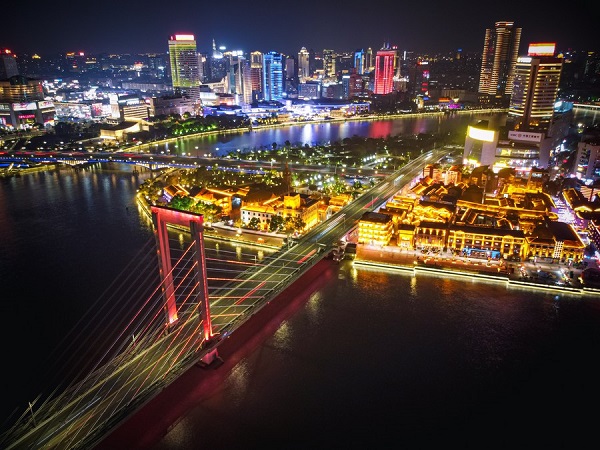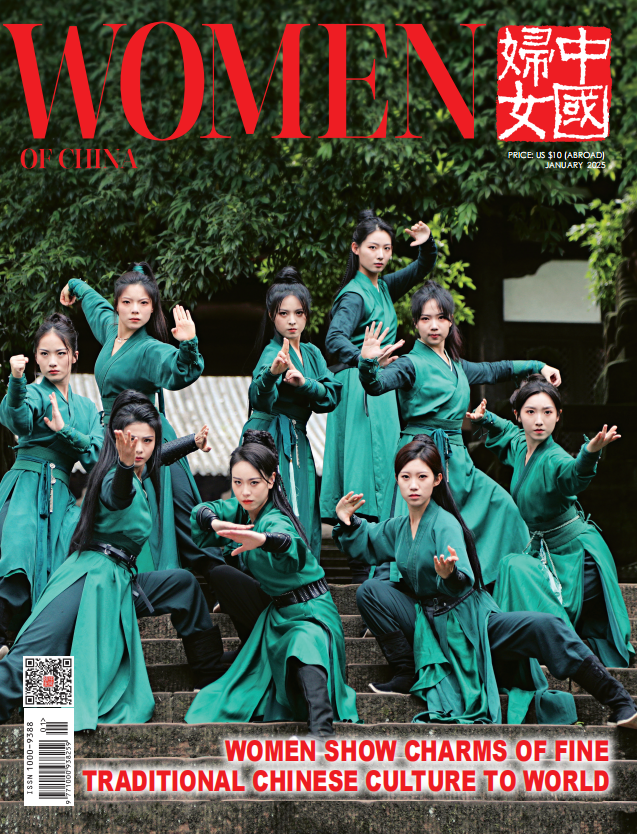Xi Focus: Exploring Xi's Economic Thought from Local Governance Perspective: Story in Zhejiang
 |
| This aerial photo taken on Feb. 15, 2023 shows the night view of Laowaitan, a signature pedestrian street in Ningbo, east China's Zhejiang Province. [Xinhua/Jiang Han] |
BEIJING, March 18 (Xinhua) — A recently released report titled "Toward Modernity: The Value of Xi Jinping's Economic Thought" has explored the origins of Xi's economic thought from the perspective of local governance.
When working in different localities, Xi put forward a series of new ideas, new ways of thinking and new measures concerning economic work. His years of solid practice on the ground have enriched his experience and enhanced the depth of his theoretical thinking, laying a solid foundation for his economic thought to take shape and evolve.
Recounting Xi's stories of economic governance when he worked at the local level, the report, which was released by New China Research, the think tank of Xinhua News Agency, has offered a vivid illustration on how Xi's economic thought helped promote local development.
The following piece tells Xi's story in Zhejiang.
From October 2002 to March 2007, Xi served as deputy secretary of the Communist Party of China (CPC) Zhejiang Provincial Committee, acting governor of Zhejiang Province, and secretary of the CPC Zhejiang Provincial Committee.
During his work in Zhejiang for more than 1,600 days, Xi traveled over all 90 counties, cities and districts in this province, and put forward a series of important statements and concepts that became an important source of his strategy for governing the country after becoming general secretary of the CPC Central Committee.
Green Development
Located in the hinterland of the Yangtze River Delta, Anji County in Zhejiang Province has a vegetation coverage rate of 96 percent. At the entrance of Yu Village of Anji County, a sentence was written on a stone tablet: "Lucid waters and lush mountains are invaluable assets."
This is the origin of the concept of "lucid waters and lush mountains are invaluable assets".
On Aug. 15, 2005, Xi, then secretary of the CPC Zhejiang Provincial Committee, visited Yu Village and put forward the concept for the first time.
Yu Village had once developed a "stone economy" by selling high-quality limestone mined from mountains. It was covered in dust and smoke all year round. At the beginning of the 21st century, the village shut down all cement plants and mines to improve the environment.
During the visit, Xi said: "It is a brilliant move for you to shut down the mines."
"We used to say that we wanted both lucid waters and lush mountains, as well as mountains of gold and silver. In fact, lucid waters and lush mountains are invaluable assets," he added.
A few days later, he published a commentary in a column for Zhejiang Daily, pointing out that lucid waters and lush mountains can bring mountains of gold and silver, but mountains of gold and silver can't buy lucid waters and lush mountains. The two have contradictions, but can be dialectically unified at the same time.
Guided by this concept, Yu Village has formed a new type of rural ecological economy, in which the village can attract tourists and develop agriculture at the same time.
In an interview with Xinhua in October 2022, Wang Yucheng, Party chief of the village and head of the village committee, said that Yu Village has been a direct beneficiary of the concept of "lucid waters and lush mountains are invaluable assets," with villagers' per capita disposable income increasing sevenfold in the past decade.
The concept of "lucid waters and lush mountains are invaluable assets" opened a new path for Zhejiang's development.
In 2019, the province passed the acceptance test of the pilot project of national ecological province construction. Since the 18th CPC National Congress, the level of public satisfaction with the ecological environment in Zhejiang Province has increased for 11 consecutive years.
Since the 18th CPC National Congress, Xi has summarized and interpreted the concept on many occasions.
In 2013, he put forward the theory of "lucid waters and lush mountains are invaluable assets," featuring coordination between conservation and development, on the international occasion for the first time.
In October 2015, the Fifth Plenary Session of the 18th CPC Central Committee put forward a philosophy of innovative, coordinated, green, open and shared development for the first time.
In 2017, the concept was written into the CPC Constitution.
The concept promotes economic development and ecological conservation in China at the same time, and injects positive energy into the harmonious coexistence between man and nature on a global scale.
Private Economy
Zhejiang, one of the important birthplaces of China's private economy, is home to more than 9 million market entities, meaning there is one business owner in every seven people based on its permanent resident population.
Vigorously developing the private economy was one of the tasks Xi attached great importance to during his stay in Zhejiang.
When he worked in Zhejiang, Xi once said, "the biggest advantage of the province is the first-mover advantage of the private economy. I have been thinking about how to leverage this advantage."
He reiterated that the private economy represented the vitality of Zhejiang, it is necessary to continue to encourage, support and guide the development of the non-public economy, and state-owned and private enterprises should be treated equally.
He also led the formulation of a series of policies and measures to promote the new development of the private economy.
During his survey in local areas of Zhejiang, Xi often paid visits to private companies, taking heed of their difficulties and demands.
In December 2002, he visited some major private-economy cities — Ningbo, Taizhou and Wenzhou. During the trip, Xi highlighted several keywords, including rebuilding advantages, deepening reform and improving the work style.
"I am very concerned about the development of the non-public economy. If the company has important issues in the future, you can come directly to Hangzhou and meet me in my office," Xi said to Nan Cunhui, CHINT Group's chairman, during his inspection visit to the company.
In 2003, in response to the requirements of the Zhejiang provincial Party committee and provincial government, the company planned to implement an internationalization strategy to build itself into an advanced electrical appliance manufacturing enterprise.
Xi spent almost two hours in his office patiently listening to Nan's report and gave positive encouragement. Now, recalling the meeting at the time, Nan is still deeply moved.
A slew of policy measures have significantly invigorated private enterprises in the province. In the 2022 list of China's top 500 private companies, Zhejiang had 107 companies listed, ranking first for 24 consecutive years.
More importantly, the private and the state-owned economies in Zhejiang have been integrating with each other, complementing each other and developing side by side.
Rural Revival
In June 2003, Xi, then secretary of the CPC Zhejiang Provincial Committee, initiated the Green Rural Revival Program. He planned to renovate about 10,000 incorporated villages in the next five years and transform about 1,000 central villages among them into examples of moderate prosperity in all respects.
Ahead of the Chinese Lunar New Year in 2003, Xi visited Hengkantou Village located at an old revolutionary base in Yuyao City of Zhejiang.
During a discussion, he said, "Only when people in old revolutionary base areas become rich, can Zhejiang truly achieve common prosperity. Only when people in old revolutionary base areas live a well-off life, can Zhejiang truly turn into a well-off society in an all-round way."
With the promotion of the Green Rural Revival Program, Hengkantou Village, once impoverished and backward, had become a well-off and civilized village by developing red tourism, which refers to visiting historical sites with revolutionary legacies, and utilizing green resources.
On March 1, 2018, more than 2,000 villagers in Hengkantou Village received a reply from the Party's top leader. The villagers wrote a letter to Xi on Feb. 10, telling him the latest development of the village, but didn't expect him to reply soon.
Although 15 years had passed, Xi had always been concerned about the villagers and was pleased with the development of the village.
Great changes have also taken place in Xiajiang Village, Chun'an County, which is 300 kilometers away from provincial capital Hangzhou and also a grassroots work base for Xi when he worked in Zhejiang. He went to Xiajiang Village four times for investigation and wrote letters twice to encourage villagers.
Adhering to the concept of green development, Xiajiang Village has changed from "the dirty, chaotic, and poor" to "the green, wealthy, and beautiful." The per capita disposable income of the village in 2021 reached 46,959 yuan (about 6,800 U.S. dollars), more than 20 times that of 20 years ago.
"The great changes in the small mountain village benefited from Xi's care and the strategy of 'making full use of eight advantages and implementing eight major measures,'" said Jiang Lijuan, Party chief of Xiajiang, also a delegate to the 20th CPC National Congress.
The strategy, put forward by Xi in 2003, called on the province to make use of its eight advantages, such as system and mechanism advantage, location advantage and industry advantage, to implement eight major measures for Zhejiang's development.
Guided by the strategy, the Green Rural Revival Program, Mountain-Sea Collaboration Project, and other projects got implemented successively in Zhejiang.
A large number of poor mountain villages have become ecological and well-off by utilizing green resources, expanding agriculture based on unique local features, and cooperating with developed districts and counties for development. More and more villagers began enjoying a better life.
In 2015, Zhejiang became the first province in China to complete the task of poverty alleviation at a high level.
In the past 10 years, the income gap between urban and rural residents in Zhejiang has narrowed from 2.37 fold to 1.94 fold, and the gap between the highest and lowest incomes of local residents has narrowed from 1.76 fold in 2013 to 1.61 fold.
During Xi's tenure in Zhejiang, he pointed out that there should be no blind spots in the modernization drive, and not a single village, town, or person should be left behind in the pursuit of moderate prosperity in all respects.
Xi has been committed to the concept of "not a single person should be left behind" throughout his work, whether it's winning the battle against poverty, building a moderately prosperous society in an all-around way, or promoting common prosperity steadily.
(Source: Xinhua)
Please understand that womenofchina.cn,a non-profit, information-communication website, cannot reach every writer before using articles and images. For copyright issues, please contact us by emailing: website@womenofchina.cn. The articles published and opinions expressed on this website represent the opinions of writers and are not necessarily shared by womenofchina.cn.






.jpg)

 WeChat
WeChat Weibo
Weibo 京公网安备 11010102004314号
京公网安备 11010102004314号